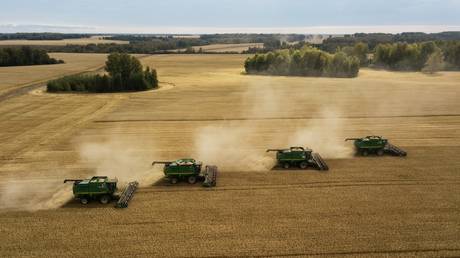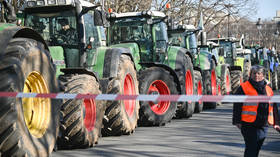New import duties on Russian agriculture would only further disrupt the global food supply, Moscow has warned
A European Union plan to impose tariffs on grain imports from Russia and Belarus is an example of “unfair competition,” Kremlin spokesperson Dmitry Peskov said on Friday.
The proposal was unveiled earlier in the day by European Commission President Ursula von der Leyen in Brussels. It would levy a duty of up to 50% on grain imports from both countries.
The EU plans to impose a tariff of €95 ($103) per ton on cereals, oilseeds, and derived products such as vegetable oil originating from Russia and Belarus and intended to be sold in the bloc.
“Consumers in Europe will definitely suffer. We have many alternative supply routes,” Peskov said when asked who would be hit the hardest by the measure, adding that “this is another clear example of unfair competition.”
According to von der Leyen, the move is designed to “prevent Russian grain from destabilizing the EU market in these products.” EU officials have claimed previously that Moscow is “flooding” the bloc with cheap cereals.
EU statistics analyzed by RIA Novosti this week showed that Russia almost halved grain supplies to the bloc in January compared to December, while Ukraine boosted deliveries of its produce by 35% to 2.6 million tons. Russian agricultural exports to the EU slumped to just 108,000 tons in January, figures show.
The new initiative, which still needs to be approved by bloc members, comes amid sweeping protests by European farmers in recent months. Producers have been objecting to a large influx of cheap agricultural imports from Ukraine following the EU’s decision to suspend tariffs and quotas for produce from the embattled country.
Russian Foreign Ministry spokeswoman Maria Zakharova mocked von der Leyen’s plan to slap tariffs on Moscow’s foodstuffs in a Telegram post on Friday.
“Is she really worried about starving countries? How will such measures contribute to global food security?” Zakharova said.
According to her, the move will only further “worsen the situation with the global food supply which has already been brought to the point of absurdity by the West.”
The expected duty will be set at the maximum allowed under the World Trade Organization’s rules, according to a Financial Times report published earlier this week. It would be the first time that restrictions were placed on Russian food products and would drive prices up by at least 50%, “eradicating” demand, economists in the EU have warned.






